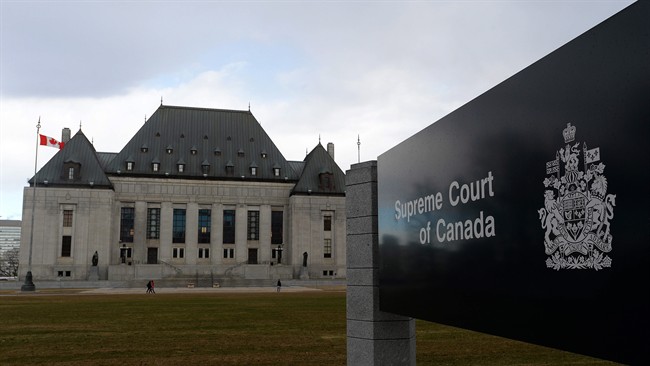OTTAWA — The Supreme Court of Canada has ruled that the manslaughter conviction of an Ontario aboriginal man should not be overturned because of a lack of aboriginal jurors.

By a 5-2 margin, the high court found that a northern Ontario community made reasonable efforts to ensure the jury in a manslaughter case had adequate aboriginal representation.
The decision overturns the 2011 Ontario Court of Appeal ruling that found the absence of aboriginals on the jury violated Clifford Kokopenace’s constitutional rights, and threw out his 2008 conviction.
READ MORE: Supreme Court rejects federal bid to consider Omar Khadr adult offender
Kokopenace had been found guilty of stabbing a friend to death on the Grassy Narrows reserve in northwestern Ontario.
Kokopenace’s Kenora district jury was selected from a panel of 175 potential jurors, only eight of whom were on-reserve residents.
None of those made it on to the jury.
The high court’s ruling restores Kokopenace’s original conviction.
The judgment said there was a significant decline in the response rates to jury notices that were sent to on-reserve residents in the years leading up to Kokopenace’s trial.
READ MORE: No bail for man charged with ‘heinous’ beating of Montreal bus driver, high court rules
Responses to the notices are used to compile lists of potential jurors, but by 2002 the response rate stood at 15.8 per cent and by 2008 had declined to 10 per cent.
“Consequently, the state satisfies an accused’s right to a representative jury by providing a fair opportunity for a broad cross-section of society to participate in the jury process,” wrote Justice Michael Moldaver for the majority.
He said a fair opportunity is provided when the state makes reasonable efforts to compile a jury roll using randomly selected lists that draw on a broad cross-section of society and deliver the jury notices to those who were selected.
But Justice Thomas Cromwell, with Chief Justice Beverley McLachlin concurring, issued a sharp dissent.
READ MORE: Supreme Court OKs extradition of 2 men to face cold case murder charges
“I do not regard compliance with the Constitution as either optional or as a matter of social policy,” Cromwell wrote.
“An aboriginal man on trial for murder was forced to select a jury from a roll which excluded a significant part of the community on the basis of race – his race.
“This in my view is an affront to the administration of justice and undermines public confidence in the fairness of the criminal process.”
Moldaver responded directly to that dissenting view in his majority ruling, saying he did not want to be “misunderstood.”
“There is no question that an accused is entitled, under the Charter, to a representative jury,” he wrote.
But Moldaver said he key issue for him was the “state’s efforts” to compile the jury roll, and not, as Cromwell argued, the
jury roll’s “ultimate composition.”



Comments